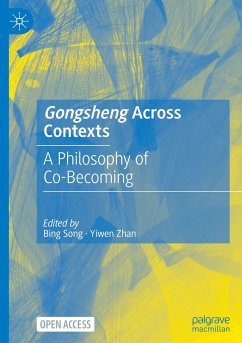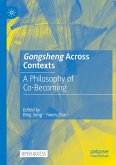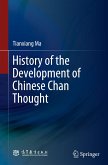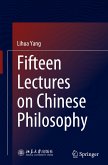Gongsheng Across Contexts
A Philosophy of Co-Becoming
Herausgegeben:Song, Bing; Zhan, Yiwen
Gongsheng Across Contexts
A Philosophy of Co-Becoming
Herausgegeben:Song, Bing; Zhan, Yiwen
- Gebundenes Buch
- Merkliste
- Auf die Merkliste
- Bewerten Bewerten
- Teilen
- Produkt teilen
- Produkterinnerung
- Produkterinnerung
This open access book sheds light on the term gongsheng/ky sei, which is used in Chinese and Japanese to not only translate "symbiosis" in biology but also broadly deployed in philosophical, social and political contexts. It is a cross-contextual attempt to study the foundation of gongsheng/ky sei as a philosophy of co-becoming, with exploration of its significance for thinking about the planetary challenges of our times.
Andere Kunden interessierten sich auch für
![Gongsheng Across Contexts Gongsheng Across Contexts]() Gongsheng Across Contexts42,79 €
Gongsheng Across Contexts42,79 €![History of the Development of Chinese Chan Thought History of the Development of Chinese Chan Thought]() Tianxiang MaHistory of the Development of Chinese Chan Thought90,99 €
Tianxiang MaHistory of the Development of Chinese Chan Thought90,99 €![A Panoramic History of Traditional Chinese Ethics A Panoramic History of Traditional Chinese Ethics]() ZHU (???) Yi-tingA Panoramic History of Traditional Chinese Ethics97,99 €
ZHU (???) Yi-tingA Panoramic History of Traditional Chinese Ethics97,99 €![A Panoramic History of Traditional Chinese Ethics A Panoramic History of Traditional Chinese Ethics]() ZHU (???) Yi-tingA Panoramic History of Traditional Chinese Ethics97,99 €
ZHU (???) Yi-tingA Panoramic History of Traditional Chinese Ethics97,99 €![Peter Schroeder-Heister on Proof-Theoretic Semantics Peter Schroeder-Heister on Proof-Theoretic Semantics]() Peter Schroeder-Heister on Proof-Theoretic Semantics30,99 €
Peter Schroeder-Heister on Proof-Theoretic Semantics30,99 €![Fifteen Lectures on Chinese Philosophy Fifteen Lectures on Chinese Philosophy]() Lihua YangFifteen Lectures on Chinese Philosophy128,39 €
Lihua YangFifteen Lectures on Chinese Philosophy128,39 €![Peter Schroeder-Heister on Proof-Theoretic Semantics Peter Schroeder-Heister on Proof-Theoretic Semantics]() Peter Schroeder-Heister on Proof-Theoretic Semantics38,99 €
Peter Schroeder-Heister on Proof-Theoretic Semantics38,99 €-
-
-
This open access book sheds light on the term gongsheng/ky sei, which is used in Chinese and Japanese to not only translate "symbiosis" in biology but also broadly deployed in philosophical, social and political contexts. It is a cross-contextual attempt to study the foundation of gongsheng/ky sei as a philosophy of co-becoming, with exploration of its significance for thinking about the planetary challenges of our times.
Produktdetails
- Produktdetails
- Verlag: Berggruen Institute / Palgrave Macmillan / Springer Nature Singapore / Springer, Berlin
- Artikelnr. des Verlages: 978-981-99-7324-8
- 1st ed. 2024
- Seitenzahl: 288
- Erscheinungstermin: 22. Januar 2024
- Englisch
- Abmessung: 216mm x 153mm x 21mm
- Gewicht: 488g
- ISBN-13: 9789819973248
- ISBN-10: 9819973244
- Artikelnr.: 68949231
- Herstellerkennzeichnung Die Herstellerinformationen sind derzeit nicht verfügbar.
- Verlag: Berggruen Institute / Palgrave Macmillan / Springer Nature Singapore / Springer, Berlin
- Artikelnr. des Verlages: 978-981-99-7324-8
- 1st ed. 2024
- Seitenzahl: 288
- Erscheinungstermin: 22. Januar 2024
- Englisch
- Abmessung: 216mm x 153mm x 21mm
- Gewicht: 488g
- ISBN-13: 9789819973248
- ISBN-10: 9819973244
- Artikelnr.: 68949231
- Herstellerkennzeichnung Die Herstellerinformationen sind derzeit nicht verfügbar.
Bing Song is a Senior Vice President of the Berggruen Institute and Director of the Institute's China Center. She has been leading projects under the research theme of Frontier Science & Technology and East Asian Philosophies and edited Intelligence and Wisdom: Artificial Intelligence Meets Chinese Philosophers (CITIC Press 2020, Springer 2021). Yiwen Zhan is Lecturer at Beijing Normal University. He mainly works in metaphysics and epistemology. Recently, he is interested in exploring the question-sensitive structures in epistemology, decision theory, and how it might affect our understanding of modality and existence.
Part I: Introduction.- Chapter 1: What Intellectual Shift Do We Need in a Time of Planetary Risks? Inspirations from Symbiosis in Life Sciences and the Notion of Gongsheng/Ky sei.- Chapter 2: The Re-engineering of Gongsheng: On the Methodology of this Volume and its Philosophical Implications.- Part II: Gongsheng/Ky sei in Classical Philosophies.- Chapter 3: Introduction on the Ethical "Doctrine of Gongsheng" based on Song-Ming Confucianism's "Unity of Consummate Persons and Things".- Chapter 4: The Concept of Gongsheng in Daoist Philosophy: Examples from Laozi and Zhuangzi.- Chapter 5: "If Humans are Free of Disease, then Tian is Free of Disease" - Ecological Civilization and the Daoist Concept of Gongsheng.- Chapter 6: Co-dependent Origination and the Doctrine of Gongsheng: A Buddhist Perspective on The Harmony of Humanity, Nature, and Civilizations.- Chapter 7: The Gap of Wen and the Edge of Chaos: From the Conundrum of Ky sei to the "Cosmic Hope".- Part III: Gongsheng in Contemporary Contexts.- Chapter 8: How to Understand Symbiosis? - The Conflict and Integration of Two Pictures of Life .- Chapter 9: The Microbiome is Redefining What it Means to be Human.- Chapter 10: Gongsheng in Ecological Anthropology.- Chapter 11: Yaoshi Tongyuan: The Symbiotic Practice in Traditional Medicines.- Chapter 12: The Gongsheng School of International Relations: China's Experience.- Part IV: Resonance.- Chapter 13: Origins and Theoretical Foundations of Convivialism.- Chapter 14: Ontology, Conviviality and Symbiosis or: Are there Gifts of Nature?
Part I: Introduction.- Chapter 1: What Intellectual Shift Do We Need in a Time of Planetary Risks? Inspirations from Symbiosis in Life Sciences and the Notion of Gongsheng/Ky sei.- Chapter 2: The Re-engineering of Gongsheng: On the Methodology of this Volume and its Philosophical Implications.- Part II: Gongsheng/Ky sei in Classical Philosophies.- Chapter 3: Introduction on the Ethical "Doctrine of Gongsheng" based on Song-Ming Confucianism's "Unity of Consummate Persons and Things".- Chapter 4: The Concept of Gongsheng in Daoist Philosophy: Examples from Laozi and Zhuangzi.- Chapter 5: "If Humans are Free of Disease, then Tian is Free of Disease" - Ecological Civilization and the Daoist Concept of Gongsheng.- Chapter 6: Co-dependent Origination and the Doctrine of Gongsheng: A Buddhist Perspective on The Harmony of Humanity, Nature, and Civilizations.- Chapter 7: The Gap of Wen and the Edge of Chaos: From the Conundrum of Ky sei to the "Cosmic Hope".- Part III: Gongsheng in Contemporary Contexts.- Chapter 8: How to Understand Symbiosis? - The Conflict and Integration of Two Pictures of Life .- Chapter 9: The Microbiome is Redefining What it Means to be Human.- Chapter 10: Gongsheng in Ecological Anthropology.- Chapter 11: Yaoshi Tongyuan: The Symbiotic Practice in Traditional Medicines.- Chapter 12: The Gongsheng School of International Relations: China's Experience.- Part IV: Resonance.- Chapter 13: Origins and Theoretical Foundations of Convivialism.- Chapter 14: Ontology, Conviviality and Symbiosis or: Are there Gifts of Nature?








